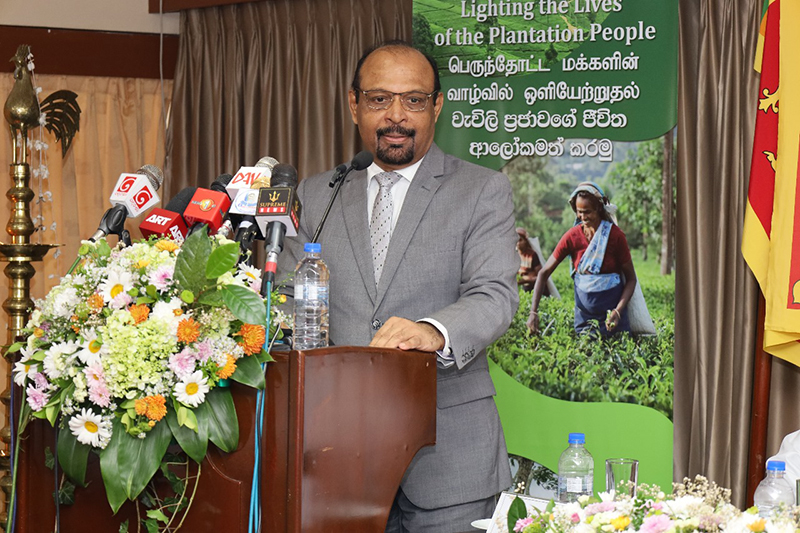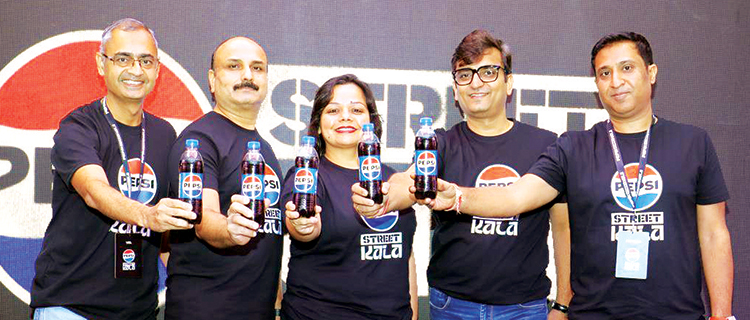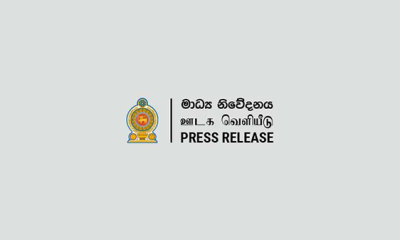Business
Justice Thurairaja makes impassioned plea on behalf of SL’s plantation community

By Ifham Nizam
‘Unveiling the hidden struggles of Sri Lanka’s plantation workers: A Call for Action’, in other words improving living conditions, providing fair wages, enhancing access to social services and ensuring that the rights of plantation workers are respected and protected under the law. This is the belief of Justice S. Thurairaja; judge of the Supreme Court of Sri Lanka.
Justice Thurairaja made an impassioned speech last week at a Caritas Sri Lanka event in Colombo, during the launch of two significant research reports: ‘Right for Education: For the Children of the Plantation Community in Sri Lanka – Issues, Challenges and Future Directions’ and ‘Culture and Identity of the Plantation Communities in Sri Lanka’. His heartfelt words resonated deeply with those present as he highlighted the hidden struggles of the plantation community.
Justice Thurairaja is the first person of Indian origin in Sri Lanka to become a Court of Appeal judge and a Supreme Court judge.
Opting to speak without a prepared script, Justice Thurairaja, who hails from the upcountry, reflected on the profound social and economic inequalities faced by the plantation workers.
He drew a poignant contrast between the smiling faces of young girls dancing at the event and the harsh reality of women labouring in the tea estates without a fraction of that joy. “I wish the ladies and girls who are plucking tea leaves also had that millionth of a smile, he remarked, emphasizing the emotional and physical toll that plantation labor takes on these workers.
In a symbolic anecdote, Thurairaja pointed to a tree planted as a sample, now standing tall at 90 feet, and used it as a metaphor for the backbreaking work performed by the plantation workers under its shade. “We see the green on top, but we don’t see the blood underneath, he stated, bringing attention to the unseen sacrifices of those whose efforts fuel Sri Lanka’s globally renowned tea industry.
The justice also touched on the complexities of identity faced by Sri Lanka’s plantation communities, often referred to as “Indian Tamils.” He reflected on his experiences in Fiji and Malaysia, observing how Indian-origin populations in those countries had largely lost their cultural identities. In contrast, he praised the plantation community in Sri Lanka for maintaining its cultural roots despite significant challenges. However, he noted that identity issues remain, particularly due to the erroneous classification of Indian-origin Tamils as Sri Lankan Tamils during census registration, leading to the gradual erosion of their unique heritage.
Thurairaja also critiqued the economic model that continues to marginalize plantation workers. “Ceylon tea is marketed worldwide, bringing significant foreign exchange into the country, but are these workers compensated? Isn’t it blood money? he asked, referring to the dire conditions under which tea is produced.
He also shared a harrowing personal account of a mother who sold her kidney to ensure her child’s education, emphasizing the extreme sacrifices made by plantation workers in pursuit of better opportunities for their children.
Business
Political risks to Sri Lanka’s debt restructuring agreement recede: Fitch Ratings

Fitch Ratings Hong Kong says that the Sri Lankan authorities’ confirmation that they endorse the targets set under the country’s IMF programme, and intend to implement debt restructuring based on the terms agreed with international sovereign bondholders in September, reduces risks to the debt treatment process associated with the outcome of the presidential election on 21 September.
The election of Anura Kumara Dissanayake, of the opposition Janatha Vimukthi Peramuna (JVP), as president in September had increased policy uncertainty, raising the risk that the government could launch challenges to key elements of the IMF programme, potentially delaying Sri Lanka’s foreign currency debt restructuring. However, the Ministry of Finance announced on 4 October that consultations with the IMF and Sri Lanka’s Official Credit Committee had been successfully concluded, suggesting that any policy changes are unlikely to threaten the IMF programme or the debt treatment agreement-in principle reached under the previous administration.
The Ministry also indicated that the consultation had agreed that the preliminary agreement adhered to the principle of comparability of treatment between official creditors and bondholders, and was compatible with the IMF programme’s terms.
” We view this as a positive sign for the restructuring process’s prospects. Fitch has rated Sri Lanka’s Long-Term Foreign-Currency Issuer Default Rating (IDR) at ‘RD’ (Restricted Default) since May 2022, and the government is not currently servicing its foreign-currency debt. We may move the IDR out of ‘RD’ upon the sovereign’s completion of a commercial debt restructuring that we judge to have normalised the relationship with the international financial community. Sri Lanka’s postdefault rating would depend upon our assessment of its credit profile. Fitch upgraded Sri Lanka’s LongTerm Local-Currency IDR to ‘CCC-‘ in September 2023, reflecting the completion of the local-currency portion of Sri Lanka’s domestic debt optimisation plan. We expect Sri Lanka’s government debt to remain relatively high, even if debt restructuring is completed successfully along the lines laid out in the agreements with its creditors,” Fitch says.
“The IMF forecasts Sri Lanka’s gross general government debt/GDP ratio to decline only gradually to about 103% of GDP by 2028, from about 116% in 2022, after building in a local- and foreign-currency debt restructuring. The government’s revenue/GDP ratio remains low, but the effects of several revenue-raising measures passed since May 2022 are beginning to be felt. Revenue collection in 7M24 rose by about 43% yoy, well above the nominal GDP growth rate of 9.5% in 1H24. Our baseline projections assume an increase in revenue/GDP, from 11.4% in 2023 to 15.5% in 2026, reflecting the measures already in place. However, these forecasts could be affected, if the new government introduces fiscal reforms. The IMF programme’s targets offer some flexibility for changes in the government’s fiscal policy approach.
‘The president’s capacity to push through policy changes may depend partly on the outcome of the parliamentary election on 14 November. The JVP and its allies had relatively few seats in the outgoing legislature, though the trends evident in the recent presidential election suggest that there will probably be large changes in the make-up of the new chamber.
‘The economy more broadly remains on a recovering trend. Real GDP growth was 5.0% yoy in 1H24, after contracting by 7.3% during 1H23. We expect the economy to expand by 3.9% in 2024 and to average growth of 3.6% over 2025-2026. External liquidity stresses have also eased, with foreign-exchange reserves hitting USD6.0 billion in August 2024, up almost 66% yoy. Nevertheless, the speed of the recovery in reserves is likely to be set back when Sri Lanka resumes external debt-service payments,” Fitch notes.
Business
Rotary fights breast cancer with NCCP through early detection and prevention

October is Breast Cancer Awareness Month—a time to come together not only to acknowledge a disease that affects millions but to celebrate the resilience of women and the power of early detection to save lives.With a long-standing partnership of 20 years with the National Cancer Control Programme, Rotary Club of Colombo members came out in their numbers to create awareness and joined the recent NCCP Breast Cancer Awareness Walk on October 2nd.
It is a time to reaffirm our collective responsibility toward the well-being of our mothers, sisters and daughters and those thousands of women who may one day be struck down by this disease if not detected early.
Rotary has been a beacon of hope in the fight against breast cancer, working hand-in-hand with the Ministry of Health for 20 years since 2004. This partnership with the National Cancer Control Programme has been instrumental in addressing breast cancer, which remains the leading cause of death among women aged 40 to 55 years.
Rotary’s journey began 20 years ago with the sole focus on screening and early detection and prevention to fight the rising incidence of cancer. Together with NCCP they set up a dedicated Cancer Screening and Early Detection Centre focused on breast cancer, first in Colombo and then extended to other cities to ensure no woman is left behind. These regional Breast Cancer Early Detection Clinics will bring lifesaving services closer to those who need them most.
Rotary Club of Colombo has led the way in the screening and early detection of breast cancer and invested in state-of-the-art technology at the main Cancer Early Detection Centre in Narahenpita run by NCCP, including installing a 3D tomosynthesis Digital Mammography Machine. This machine provides highly accurate screenings for breast cancer, five days a week, entirely free of charge. This represents Rotary’s unwavering commitment to ensuring early detection, which is key to improving breast cancer survival rates.
Rotary Club of Colombo was also a pioneer in introducing HPV DNA testing at the Centre for cervical cancer screening —an initiative that highlights their approach to tackling women’s cancers holistically.
Business
Pepsi® unveils its new logo with street art murals in Sri Lanka

Honouring its 125 years long legacy, Pepsi®, a brand that has been at the center of global pop culture, unveiled its new identity in Sri Lanka through its groundbreaking campaign, ‘Pepsi® Street Kala’. The ‘Pepsi® Street Kala’ campaign represents a groundbreaking moment for the brand, introducing its revamped brand identity through public art for the first time globally. With 17 murals featured across the country, this initiative is an attempt to democratize art through dynamic experiences that invite public interaction and make art and culture more accessible.
Pepsi® celebrated this milestone with a spectacular launch event at the iconic Lotus Tower – South Asia’s tallest self-supported tower. The event brought its bold identity to life through immersive experiences, captivating the audience from start to finish. Media, influencers and individuals from the art community in Sri Lanka enjoyed a sensory feast, with the aura of Pepsi® resonating throughout, showcasing the brand’s vibrant spirit. The highlight of the evening was the illumination of the Lotus Tower in Colombo with Pepsi®’s new bold colors, transforming the city’s skyline.
Speaking on the launch, Anuj Goyal, Associate Director, Area-Countries Region, PepsiCo said, “Pepsi has consistently been at the forefront of youth culture and with this initiative, we are extending that dedication to the streets of Sri Lanka. The new Pepsi logo represents a bold new chapter for Pepsi, bringing it to life through street art with the ‘Pepsi® Street Kala’ campaign – enabling us to expand the horizons of visual narrative. The grand launch event, including the striking projection of our brand colors at the iconic Lotus Tower and the murals altogether, are a celebration of youth, creativity, and the spirit of Pepsi.”
Also commenting on the launch, Sandeep Kumar, Country Head at Varun Beverages Limited (VBL) – Sri Lanka also added, “We are excited to bring the ‘Pepsi® Street Kala’ campaign to life in Sri Lanka, showcasing the refreshed brand identity of Pepsi. This campaign and today’s event celebrates creativity, culture, and the unbreakable bond Pepsi shares with the people of Sri Lanka. We’re proud to be part of this milestone that reflects the vibrant energy of the Pepsi consumers, while integrating public art experiences in their routine commute.”
-

 News5 days ago
News5 days agoSajith top presidential election spender
-

 Business6 days ago
Business6 days agoSri Lanka Tourism surpasses 2023 tourist arrivals
-

 Features5 days ago
Features5 days agoThe Economy, Executive Presidency, and the Parliamentary Election
-

 Sports6 days ago
Sports6 days agoAbheeth takes five but St. Anthony’s ahead
-

 News5 days ago
News5 days agoRajeev Amarasuriya to run for BASL President 2025/26
-

 Business3 days ago
Business3 days agoADB delegation meets President Dissanayake, pledges continued support for Sri Lanka’s economic development
-

 Sports5 days ago
Sports5 days agoHas Sri Lanka unearthed a special talent?
-

 Business5 days ago
Business5 days agoAviyana becomes main sponsor of Sri Lanka Trade Fair Dubai 2024











